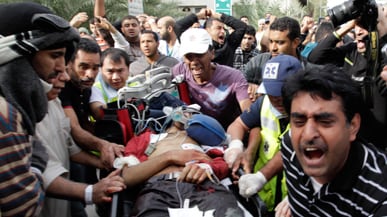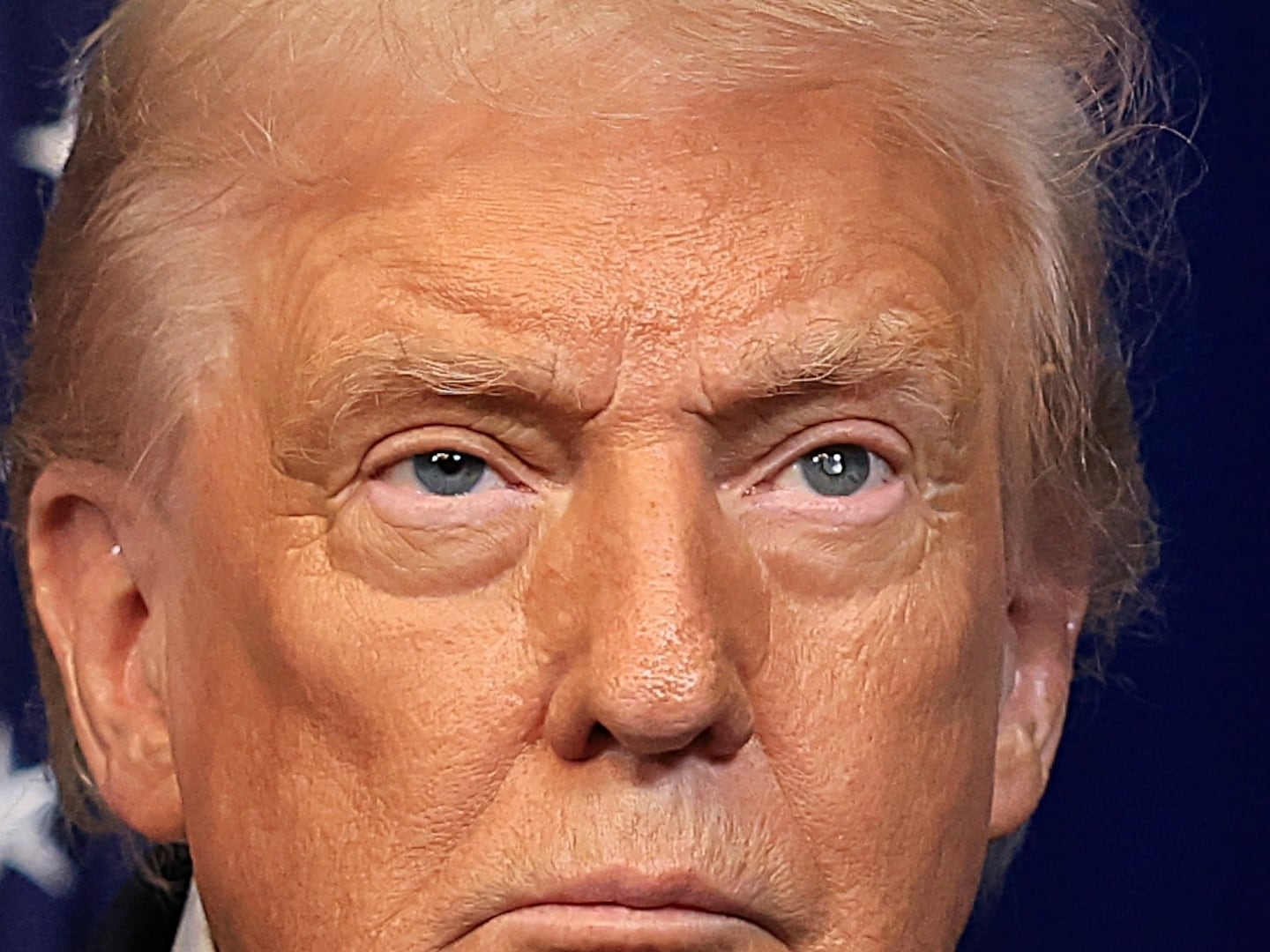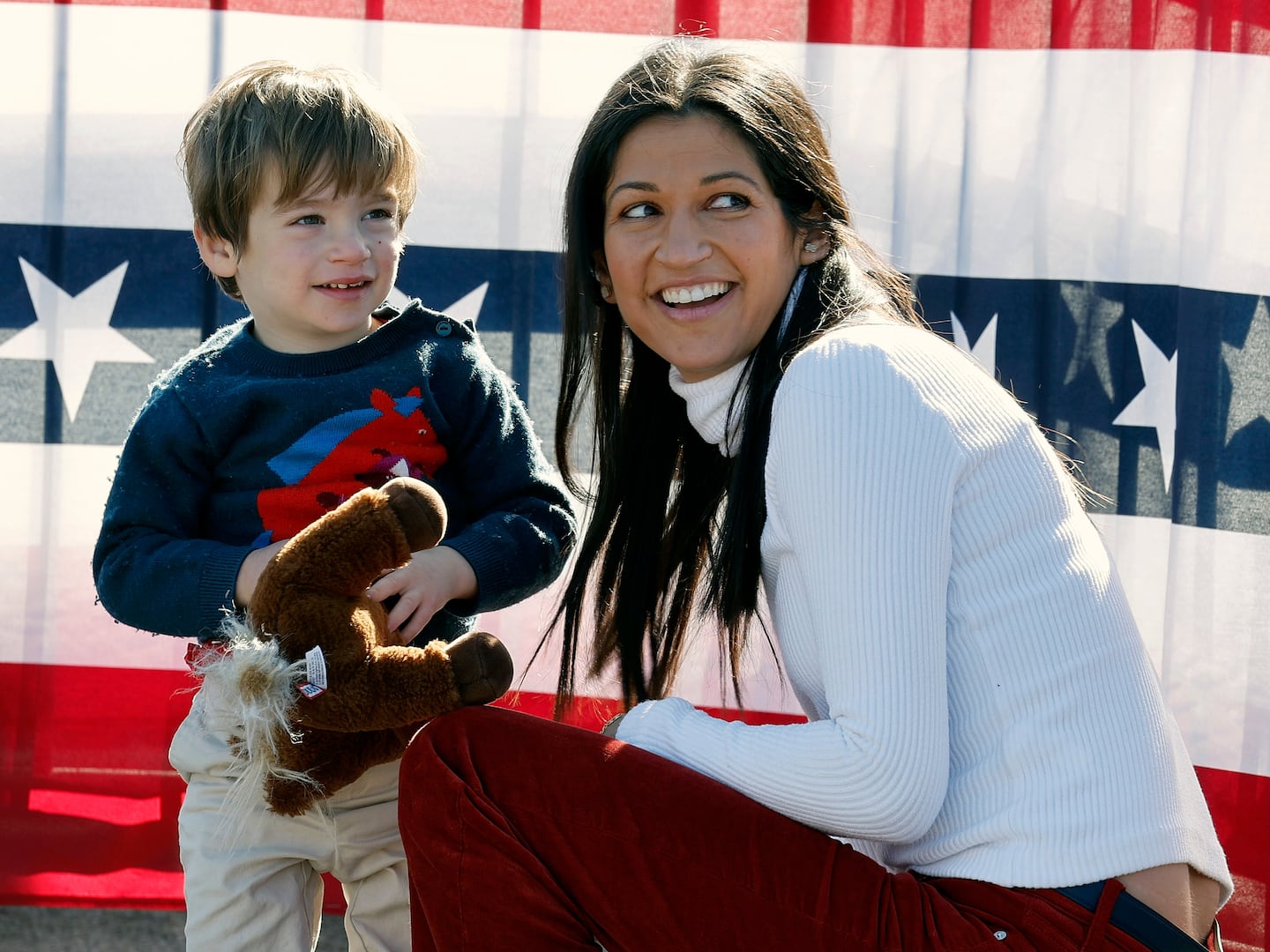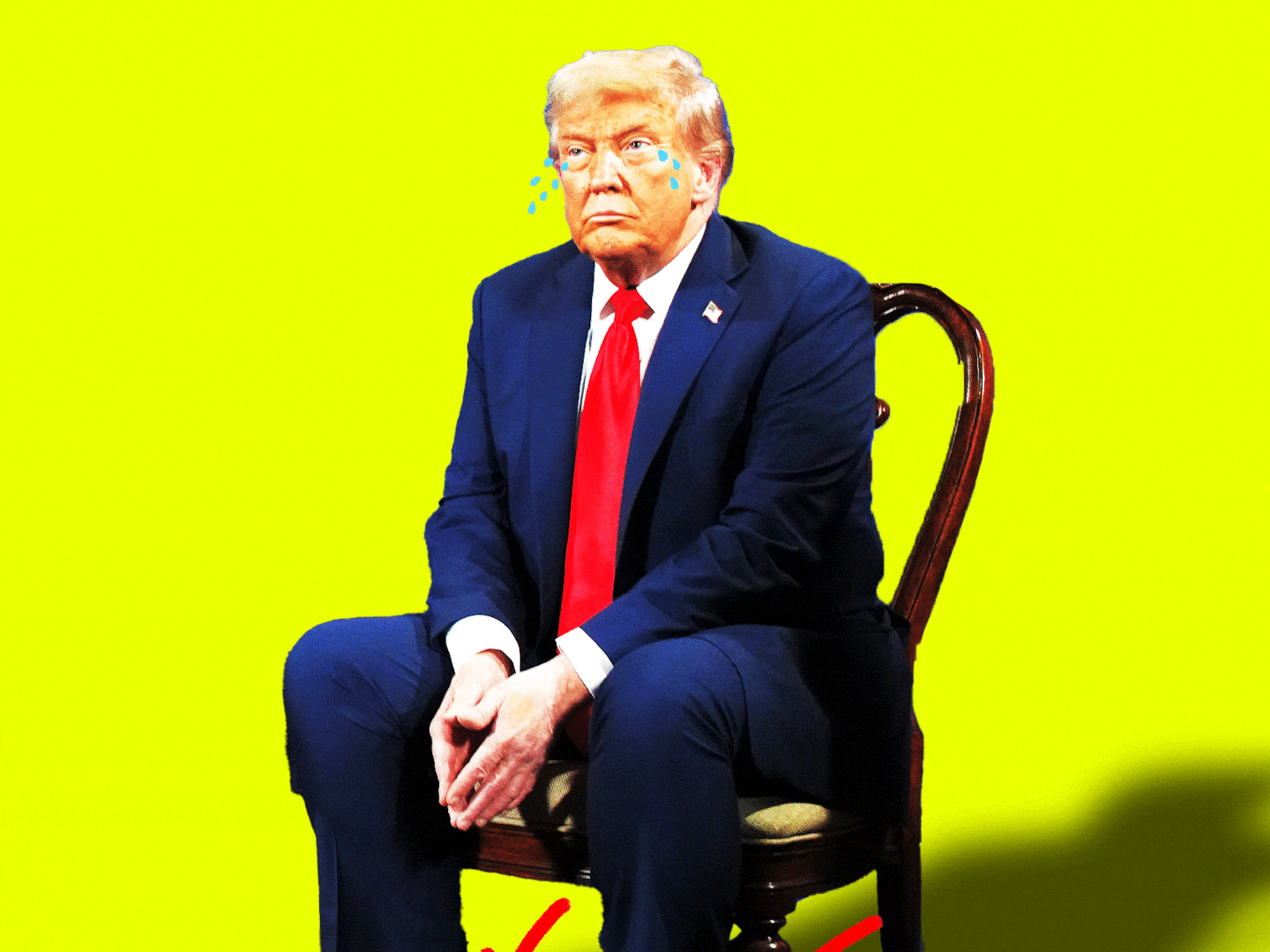Bahrain’s turmoil continued Friday, as thousands of people turned out for the funerals of protesters killed during anti-government demonstrations.
Karen Leigh reports from inside the hospital, where family mourned a young man’s death.
Ali Ahmed Abdulla Ali didn't have to go back to Pearl Square.
The 22-year-old civil engineering student, who'd been camped out there at 3 a.m. Thursday when Bahraini police officers launched a violent offensive against the mostly sleeping protesters, was safely on his way out of the tear gas cloud when someone called to go back.
Photos: Bahrain Riots
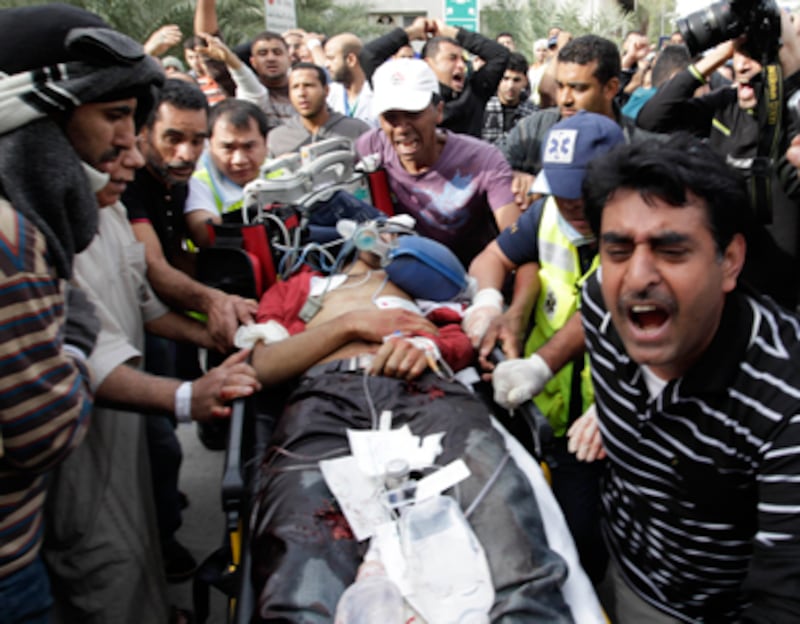
"There's women and children! We must save them!"
Back he went, and he got shot in the stomach and rushed to nearby Salmaniya Hospital, closest to the roundabout.
Hours later I am there talking to his father and brother, who are sitting outside the ICU while Ali clings to life. Both are trembling.
"When someone dies here, he is martyred," the father says. I have several sons. I would serve them all by way of death just to get this country free.” He says his son would have gone to Pearl yesterday even knowing that he would be attacked. His brother is also a civil engineering student. He can only nod.
Fifteen minutes later, it is announced that a man has died inside. I go in and there is Ali, on his deathbed. His father is kneeling and holding his hand. His comrades—all young, strong guys—are openly sobbing. They are holding each other.
Out in the hall there are guttural screams. Ali's mother has sunk to the floor, pounding on her body with her fist. She wails his name over and over.
An elderly cousin goes to comfort her. He turns to me.
"This is what we do, the Khalifa."
Protests broke out in the tiny Persian Gulf nation this week, and the violence quickly escalated. Secretary of State Hillary Clinton expressed “deep concern about recent events and urged restraint moving forward," as the situation worsened. Sleeping protesters and even medical workers have been assaulted.
To the outside world, the conflict in Bahrain is simple—the Sunni King and his family regime control the Shiite majority, and the Shiites want him out so they can further prosper.
One night at this hospital can teach otherwise. Demonstrators say that the two groups are in fact united against the ruling family, which they say edits information so as to make it appear the two groups hate each other for religious reasons.
Protesters who have moved from Pearl to a new rallying point outside the hospital say they are "all one—Sunni, Shiia, doesn't matter. We just want him out."
They are fighting, they say, to democratically elect a prime minister (the current prime minister, Sheikh Khalifa Bin Salman Al Khalifa, has had a dictator's hold on the office for 42 years). They say they are fighting as "one united Bahrain," so that all Bahrainis can have the same freedom and the same financial mobility.
Mohammed, a 22-year-old ex-advertising photographer, quit that job last month to become a grassroots protest organizer.
"I had a good job, I have good English, I have everything," he says, winding through the fluorescent hospital labyrinth. "But go out to the villages and you see men whose brothers were killed, whose sisters were raped by the regime. We are fighting as one."
The mindset of these "peaceful protesters," renders them all but defenseless against a riot police force that proved itself merciless on Thursday morning.
"These are trained mercenaries," a human-rights worker says, pointing out the police helicopters motoring back and forth above, monitoring the crowd. "They don't care who they hit."
"We are not Egypt, we're not 88 million, so we're not people? We don't have rights? We want our rights."
Maryam Alkhawaja, head of foreign relations at the Bahrain Center for Human Rights, wouldn't be surprised if the cops burst into the hospital itself, if they attacked the sick.
"I expect everything from them," she says. Everyone else in the elevator is holding onto an IV pole. "They once chased women and children inside the mall—people went in the market and started hiding in fridges to get away from them."
During Thursday's clampdown, they targeted medical workers. It's a long standing tradition of theirs over decades of Bahraini protests, but never, the witnesses say, with such force.
Ambulance drivers weren't allowed to pull into the Pearl roundabout. They were dragged from their vehicles and beaten.
There are reports floating around Manama of paramedics and aid responders who were beaten by 20 cops, by 50. One of them, Ali Ekri, is a doctor at the hospital.
There were medics telling officers "let them help people, then go ahead and beat us up," someone tells me.
"I've covered many demonstrations but I can't remember attacks on sleeping protesters," says Anna Neistat, associate director for emergencies for Human Rights Watch. She's just hopped off a plane from Paris and is documenting the patients as we go room to room.
"It seemed very meditated, very well planned. We're still collecting—it's early stages—but it sounds like an excessive use of force by the police."
In a room upstairs, Abdul Elah Alahubashi, 33 and an engineer, is draped with a bloodied red flag that reads "FREE Ali Abduleman" (the activist jailed in September.)
"His wife said, 'can you carry it for him?' So I did. All day," says Alahubashi, who's sporting a seven-inch long, three-inch deep cut on his leg. He says it was given to him by an officer wielding a saw.
There's a Bahraini flag hanging to his left. He touches it and his eyes well. He says what was on everyone's mind in the square, too, before the morning's bloodbath.
"We are not Egypt, we're not 88 million, so we're not people? We don't have rights? We want our rights."
There were kids in the square who were 2, 3 years old. There were men building a barricade to protect the women and children when the officers blasted them with tear gas so thick my friend Abdul couldn't see his hand when he held it in front of his face.
Just after he was brought to the hospital, a man was deposited. Rescued from the same location. Hands and feet tied with thick plastic twine. Someone moved to untie him.
"He'd been beaten. Someone said 'take photos before you untie him,' for proof. Then he died."
His cousin holds up a camera. He took a photo in the morgue earlier in the day. It's a guy I've been hearing about for hours. Sixty years old, shot at point-blank range, his entire face blown out. There's a mash of skin and brains and blood where there used to be eyes and a nose.
"It's like they didn't want anybody to leave there," the cousin says.
Before I ran to the hospital, Bahrain's Sunni foreign minister, Khalid al-Khalifa, had issued a woefully out of touch apology for the attack.
"I am grateful for your patriotic position," he said. "The Shiites of Bahrain have allegiance to Bah. We are both Muslims. We belong to one homeland. What has took [sic] place... today was the day of happiness."
The demonstrators of Manama aren't having it.
"He came in, 'you are my babies, my sons, I'm sorry, you're sorry,' apologizing—bullshit," Abdul smirks.
The denizens of this hospital also think the U.S.' response—with Secreatry of State Clinton urging "restraint moving forward" in a call to al-Khalifa—has been underwhelming. They say U.S. support is crucial to their success.
But Bahrain—which houses the Navy's Fifth Fleet—is one of America's key allies in the Middle East, made even stronger by the recent exit of Egyptian President Hosni Mubarak.
"They've been saying there's violence on both sides—ours and the government's—and this is both frustrating and unacceptable," Alkhawaja says, leaning against a wall. She hasn't changed clothes in more than two days.
"They have an obligation, especially with their fleet here, to say, 'We will not have one of our allies killing people who are sleeping in their tents.'"
Exiting the hospital, protesters are en masse in the long driveway, punching the air, their chants a roar.
They're saying, "We answer to no one but God."
Above them, even noisier, the din of helicopters. They've been monitoring the protests for hours. Mohammed, the organizer, has got operators lining the streets outside. Everyone's saying that tonight the riot police will strike again, in plainclothes. They're out there now, waiting for people to thin out, to fall asleep, for any Western media to disappear.
"Easy targets," at least four people tell me.
But that's not on Mohammed's mind. Low-tech earpiece in place, he's become this set's director. Right now his major concern is comforting families, making sure everyone's safe for the time being.
And locating dead bodies he says were carted off from the scene before they could be counted.
Near the square, earlier in the day, he and his team had ducked into the fish market and negotiated police permits to search there. They found three big freezer spaces but weren't allowed to check inside. He has his suspicions.
"This will not stop the public," he says, as grown men weep around him and harsh lights beam onto the linoleum. "When someone becomes a martyr, it inspires more people here."
Karen Leigh is a reporter and anchor for the Hindustan Times, based in New Delhi. She has written for Time, Bloomberg, the New York Sun, the Cambodia Daily, Entertainment Weekly and Women's Wear Daily.

